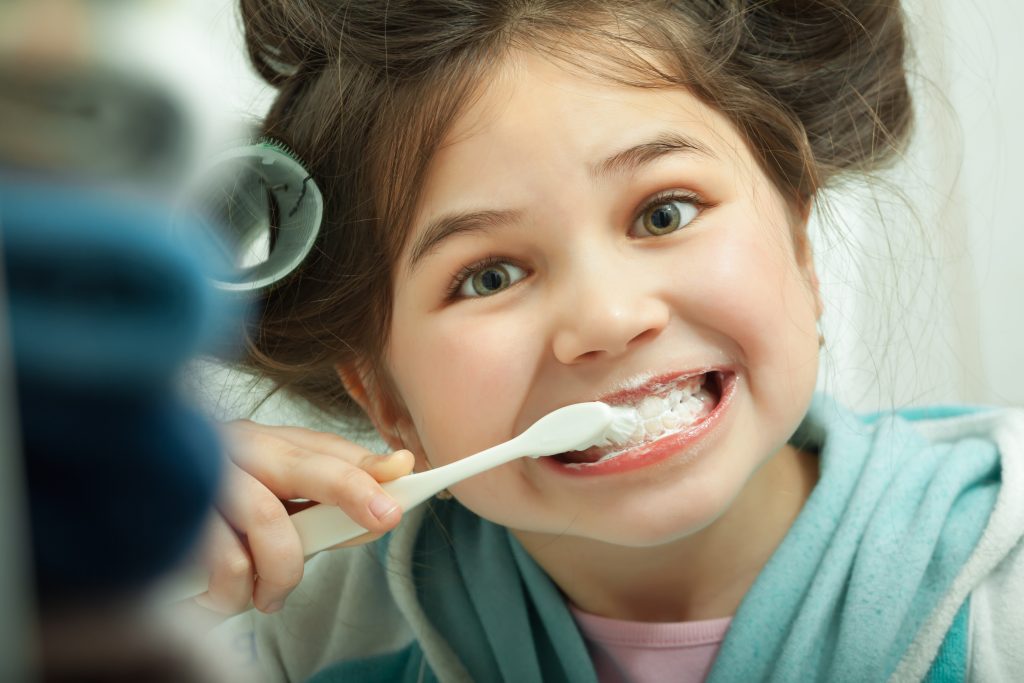For the first time in decades cavities in children are on the rise. The National Institute of Dental and Craniofacial Research reports that nearly 28% of children aged 2 – 5 develop at least one cavity. What can you do to keep your child’s teeth healthy? For answers to your most pressing dental questions, we asked Dr Stephanie, children’s dentist at Smilefocus.

When can tooth decay start?
A child’s primary (baby) teeth are especially vulnerable to decay. This is because the enamel is softer, and thinner than the enamel of adult teeth. So when foods and drinks come into contact with the teeth for long periods, or too frequently, it can start causing damage. It can be surprising to many parents that even foods and drinks that appear healthy such as fruit juice, fresh fruit and even breast milk can be a risk factor if left on the teeth for extended periods of time. Decay can start as soon as the teeth appear.
The softness of the baby teeth means that decay can spread very rapidly, sometimes even in just a few months. Dental decay is a multifactorial disease. This means that a combination of several factors is required for dental decay to begin, namely: bacteria, poor oral hygiene practices, a diet that encourages bacterial growth, susceptible tooth structure and surfaces, and availability of fluoride over time.
How many times a day should my child brush his/her teeth? For how long? Thorough tooth brushing is essential in the morning and before bed at night. The parent plays a significant role in cleaning their child’s teeth until the child has developed enough manual dexterity to clean properly by themselves, which may be even up to the age of 10 years. Use of plaque disclosing dyes is a fun way to show up areas that have been missed by changing white plaque to bright purple! Most young children are not very good at flossing however a primary site for decay is between “baby” molars. Parents need to help the child floss between all baby teeth that contact tightly together. If your child has natural spacing between their teeth then simple brushing will suffice. If you can’t manage to floss every night try at least once or twice a week- it’s better than not at all.
Are electric toothbrushes a good idea of children?
Manual and electric toothbrushes can be equally effective, however for children who don’t have the dexterity required for a manual brush, an electric brush may be easier or more comfortable to use. They are often also good as a novelty which children enjoy using and many have timers built in to ensure the children are spending enough time on their brushing.
Is Singapore water fluoridated? What are the benefits?
The water in Singapore is optimally fluoridated and in combination with fluoride toothpastes is a good source of fluoride for children. Evidence has shown that the contact of fluoride with the tooth is the most important preventive measure. It acts by physically bonding into the enamel molecules and the resulting enamel is considerably more resistant to plaque and food acid.
Your child’s adult teeth start to form at birth. Fluoride, when incorporated will help in the formation of strong healthy teeth. Be sure however that your child is able to expectorate (spit) before starting to use fluoride toothpastes because excess fluoride when ingested can cause discolouration or fluorosis of the adult teeth during development. The crowns of the adult teeth are especially vulnerable when being formed in the first 3 years of life. Half a pea sized amount of fluoridated toothpaste is all you need.
Is snacking harmful for the teeth? What are the worsts snacks?
Snacking on sugar-free foods is fine. Studies show that cheese at the end of a meal buffers harmful acids that lead to decay. Water instead of juice or soft drinks is best. Even diet drinks, which do not contain sugar, are harmful due to their acidic effect as they will erode the tooth enamel.
Sugar can be found in most foods and drinks and limiting the number of times a day your child has sugar, for example at meal times only. Sugar in between meals in the form of candy, fruit juices and soft drinks as well as snacks like biscuits and ice cream should be avoided. Sweets cannot be avoided completely but should be occasional and if possible taken at meal times only as your child can then brush their teeth afterwards which limits the length of time that the sugar is in contact with the teeth.
How often should parents bring their children in for a check up?
Children should visit with their dentist every six months for regular checkups. This is because, as previously mentioned, the decay can progress quite quickly in baby teeth and also during these years it is important to monitor your child’s overall dental development.
Dr. Stephanie is a Paediatric Dentist at Smilefocus. www.smilefocus.com.sg








